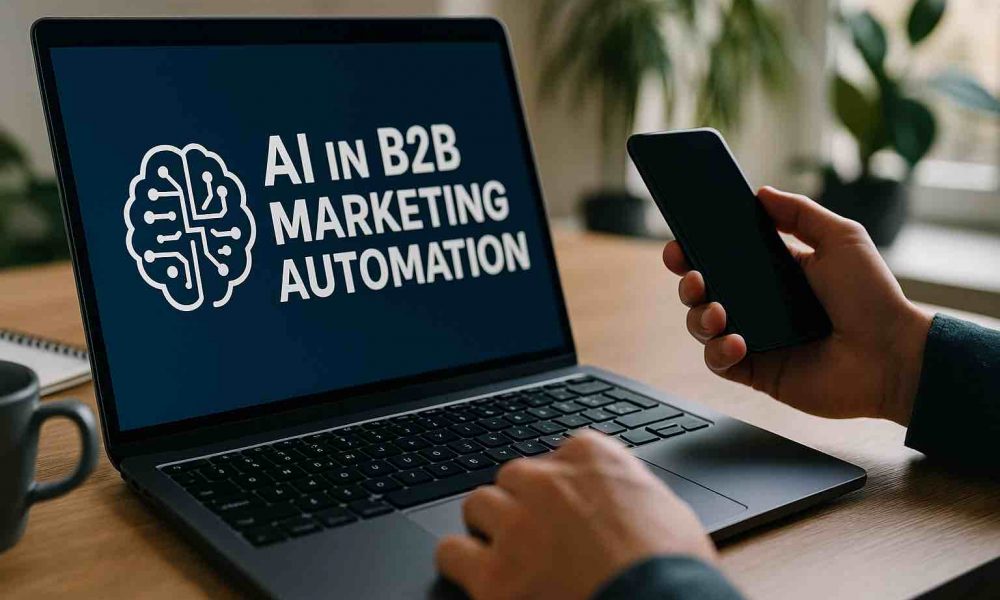How Growth Systems For B2B improves strategic planning and decision-making
Wiki Article
Open Effectiveness and Growth With AI Automation for B2B Companies
AI automation is changing the landscape for B2B business. It minimizes and simplifies procedures reliance on human treatment. This change allows businesses to make quicker, data-driven choices. As organizations discover which processes to automate, they should additionally think about the right tools to apply. Nevertheless, challenges continue to be in embracing AI technology. Growth Systems For B2B. The effects of these modifications might shape the future of several business in ways yet to be fully recognizedComprehending AI Automation in the B2B Context
As companies increasingly look for efficiency, recognizing AI automation in the B2B context comes to be vital. AI automation involves using sophisticated technologies to simplify operations, lower human intervention, and boost decision-making procedures. In the B2B landscape, this can manifest in various kinds, such as automating client service communications, managing supply chain logistics, or enhancing marketing projects. Companies can take advantage of AI to analyze large datasets rapidly, allowing them to identify patterns and understandings that notify critical choices. In addition, AI systems can integrate effortlessly with existing technologies, supplying a natural platform for handling organization functions. This understanding lays the groundwork for companies to discover how AI can transform their procedures, boost productivity, and ultimately foster sustainable development in an affordable market.Key Benefits of Carrying Out AI Automation

Determining Processes Ideal for Automation

Selecting the Right AI Equipment for Your Organization
When B2B firms think about automating their processes, selecting the ideal AI devices ends up being crucial for achieving desired end results. Companies must begin by evaluating their distinct requirements and purposes, ensuring positioning with service objectives (Business Process Automation). Evaluating the scalability, adaptability, and integration capacities of potential tools is essential, as these elements figure out lasting effectiveness. Organizations ought to likewise take into consideration user-friendliness and the degree of support offered by vendors, as these aspects can influence effective execution. In addition, evaluating client evaluations and study can provide insights into how particular AI services carry out in real-world situations. By thoroughly picking AI devices that fit their functional demands, B2B business can improve effectiveness and drive development while lessening prospective interruptionsGetting Rid Of Obstacles in AI Fostering
B2B business commonly come across considerable difficulties in embracing AI technologies, particularly issues associated with information top quality and resistance to alter administration. Poor data quality can hinder the performance of AI systems, while staff member unwillingness to accept new processes can delay application efforts - AI Automation For B2B. Resolving these obstacles is necessary for successful AI integration and optimizing its prospective benefitsData Quality Issues
Guaranteeing high data high quality is essential for the effective fostering of AI modern technologies in business-to-business atmospheres. Incorrect, incomplete, or outdated information can significantly hinder AI campaigns, causing erroneous understandings and poor decision-making. Firms commonly face obstacles such as data silos, incongruities across various sources, and an absence of standardized information formats. To get over these concerns, organizations have to buy data cleansing, integration, and governance procedures. Carrying out durable data monitoring practices ensures that the information fed into AI systems is reliable and appropriate. In addition, promoting a society of information high quality recognition amongst workers can boost information accuracy gradually. By addressing data high quality problems, B2B companies can release the full capacity of AI automation, driving performance and development.Change Management Resistance

Measuring the Influence of AI Automation
Determining the impact of AI automation in B2B firms needs a clear understanding of essential efficiency signs (KPIs) that align with organization goals. Effective information analysis strategies are necessary for interpreting the outcomes, while robust ROI analysis techniques help figure out the financial advantages of automation efforts. With each other, these components supply a comprehensive structure for assessing AI's payments to organizational success.Trick Performance Indicators
Trick performance signs (KPIs) act as vital tools for B2B business to analyze the efficiency of AI automation campaigns. By establishing clear metrics, organizations can gauge improvements in functional efficiency, expense decrease, and revenue growth straight attributable to automation. Common KPIs include cycle time decrease, mistake rates, client contentment scores, and worker performance degrees. These indicators supply understandings into how AI systems are enhancing procedures and enhancing overall performance. Furthermore, tracking KPIs makes it possible for companies to identify areas for additional renovation and to straighten AI automation efforts with tactical service goals. Ultimately, a well-defined structure of KPIs warranties that B2B firms can quantitatively evaluate the impact of AI automation on their operations and drive constant growth.Data Analysis Methods
Efficient information evaluation strategies play a crucial role in evaluating the impact of AI automation within B2B companies. By utilizing statistical methods, organizations can identify trends and patterns in operational information, permitting them to assess the performance gains attained via automation. Strategies such as regression evaluation and time collection forecasting offer insights into just how AI-driven processes influence productivity and decision-making. Additionally, information visualization devices can successfully interact findings to stakeholders, helping with informed strategic choices. Artificial intelligence algorithms can even more enhance evaluation by anticipating future results based on historic data, offering workable understandings. Ultimately, these techniques make it possible for B2B business to measure success and maximize their AI automation efforts, guaranteeing alignment with service goals and enhancing general performance.ROI Analysis Methods
Assessing the return on financial investment (ROI) of AI automation is crucial for B2B business looking for to comprehend the financial ramifications of their technological campaigns. Companies can use different ROI analysis techniques to gauge the efficiency of AI implementations - Growth Systems For B2B. One effective technique involves determining cost savings by contrasting operational costs before and after automation (Minarik AI). In addition, determining productivity enhancements through vital efficiency indicators (KPIs) assists quantify the advantages of AI. Customer satisfaction metrics can likewise provide understandings into the effect of automation on service high quality. To guarantee a detailed evaluation, firms ought to think about both direct intangible benefits and monetary returns, such as boosted decision-making abilities and affordable benefit. This complex evaluation makes it possible for B2B companies to make informed choices concerning future financial investments in AI technologyFuture Patterns in AI Automation for B2B Firms
What developments exist in advance for AI automation in B2B companies? Emerging patterns show a significant change in the direction of enhanced data analytics abilities, making it possible for companies to make more enlightened choices. Predictive analytics will become progressively crucial, allowing companies to expect market modifications and consumer demands. Additionally, the integration of AI with Web of Points (IoT) modern technology is anticipated to simplify operations by providing real-time insights and automation of processes. Business will likewise concentrate on enhancing client experiences via customized advertising and marketing additional info driven by AI formulas. Improvements in all-natural language processing will facilitate better interaction in between clients and companies. As these trends evolve, B2B companies have to adjust to take advantage of AI automation successfully, guaranteeing sustained development and affordable advantage.Frequently Asked Questions
What Industries Advantage one of the most From AI Automation in B2B?
Manufacturing, finance, medical care, and logistics sectors benefit the most from AI automation in B2B. These fields take advantage of AI to enhance processes, boost decision-making, and enhance overall functional effectiveness, driving significant growth and technology.Exactly How Does AI Automation Impact Staff Member Duties and Responsibilities?
AI automation reshapes staff member functions and responsibilities by enhancing repeated jobs, allowing workers to concentrate on strategic campaigns. This shift promotes ability development, boosts efficiency, and encourages partnership, ultimately driving business growth and advancement.What Prevail Misconceptions Regarding AI Automation in B2B?
Usual misunderstandings concerning AI automation in B2B include anxieties of work loss, beliefs that AI can fully change human judgment, and undervaluing the significance of partnership in between AI systems and workers for excellent outcomes.How Can Services Ensure Information Privacy With AI Automation?
Businesses can ensure data personal privacy with AI automation by implementing robust security protocols, sticking to regulatory conformity, conducting normal audits, and training workers on information managing methods to mitigate dangers and protect delicate information.What Are the Expenses Associated With Carrying Out AI Automation?
The expenses linked with carrying out AI automation consist of software program purchase, infrastructure upgrades, training workers, continuous maintenance, and potential downtime during integration. Furthermore, companies may incur costs related to information protection and conformity steps.Gauging the influence of AI automation in B2B firms needs a clear understanding of crucial performance indicators (KPIs) that line up with organization purposes. Secret performance indicators (KPIs) serve as necessary devices for B2B companies to analyze the efficiency of AI automation initiatives. Reliable information analysis strategies play a vital role in reviewing the impact of AI automation within B2B companies. Assessing the return on financial investment (ROI) of AI automation is essential for B2B companies seeking to comprehend the economic effects of their technical efforts. What innovations lie in advance for AI automation in B2B companies?
Report this wiki page